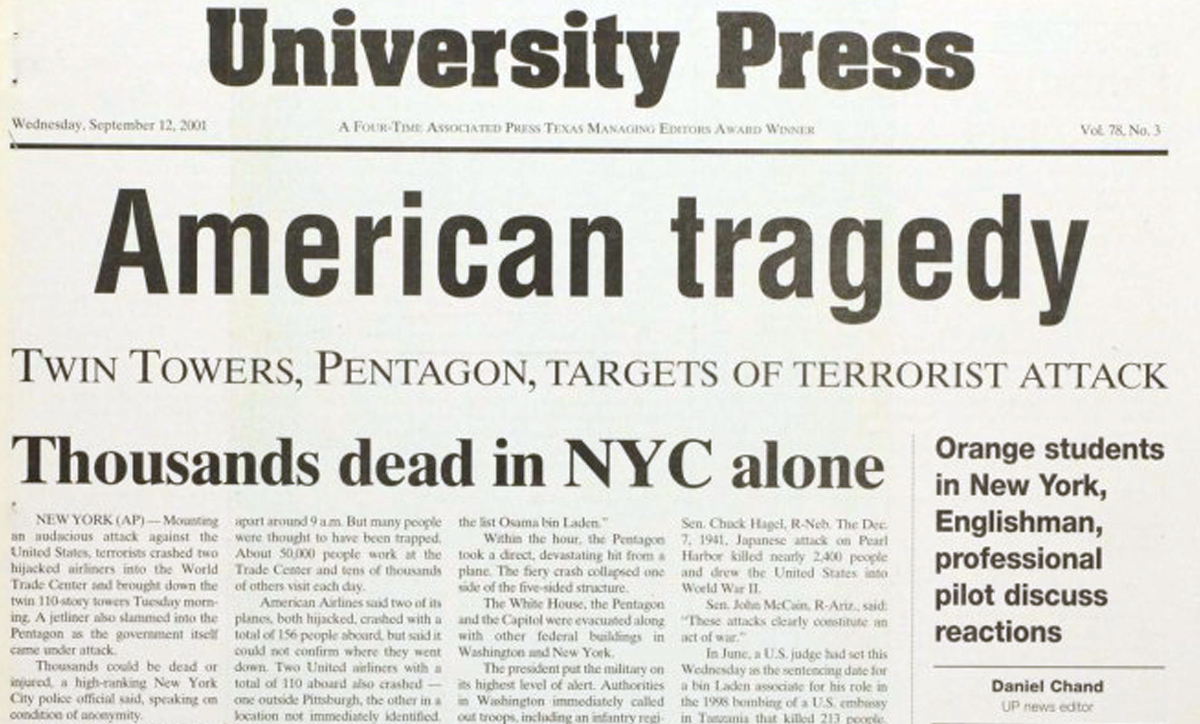
On Sept. 11, 2001, terrorists hijacked four passenger airplanes and carried out attacks against the United States, taking the lives of almost 3,000 people and injuring more than 6,000 others.
While those of us who experienced that day will never forget it, 23 years on there is a generation of students for whom it is just something from the history books.
Emma Nelson, Lumberton sophomore, said she learned about 9/11 at school, starting around Pre-K.
“Every year it was roughly the same,” she said. “We barely did any schoolwork on 9/11. Every teacher would talk about where they were when the attacks had happened. Some would play videos. I can remember almost every year watching a video montage set to the song ‘God Bless the U.S.A.’ by Lee Greenwood. The montage would include pictures of people jumping from the towers, footage taken from people inside their apartments in NYC who happened to catch the planes crashing into the towers, and then pictures of all the names listed at the memorial.”
Nelson said her father enlisted shortly after 9/11 as a result of what he saw.
“We don’t talk about it much, as my dad served under Operation Enduring Freedom in Iraq and was medically discharged and is a Purple Heart recipient,” she said. “From my understanding, talking about 9/11 brings up depressing memories that could potentially trigger his PTSD.”
When she was younger, Nelson said she recalls overhearing prejudice against Muslims and Islamic peoples in public and wondering why people had so many problems with hijabs and turbans.
“Once I got older, I finally understood where the xenophobia I had witnessed growing up was rooted from,” she said. “I had a Muslim friend in high school who received many unnecessarily cruel comments and even some death threats from our peers. When his younger sister had begun wearing a hijab, the comments became increasingly worse for both.”
Nelson said her school refused to do anything, about the abuse as that they did not want to interfere with students’ freedom of religion.
“I believe that since 9/11, xenophobia in our country has grown exponentially,” she said.
Sara Hägglund, Gothenburg, Sweden senior, said she is not sure when she heard about 9/11 the first time.
“My parents told me about it, and it was also mentioned it in school briefly, sometimes,” she said. “On the anniversary each year, my country has recognition about it. I’m not sure how it has affected me, but I have asked myself and wondered why there is so much security in airports and have been told that it is because of 9/11.”
Graduate student Adar Chowdhury is from Bangladesh. He said he reads and watches newspapers and television channels with the latest news around the world, so he was alerted to the news of the attacks immediately.
“I noticed all the countries globally connected with each other in every aspect,” he said. “My family and I were impacted badly in terms of economic recession. I was personally mentally shocked, and my psychological issues were disturbed significantly. I kept asking myself how it was possible that someone or a group of people could attack such a large infrastructure in the U.S., with passenger planes carrying peoples of different races and ages that were innocent.”
Chowdhury said he struggles to understand how the victim’s families survive and recover from such a loss.
After nearly a quarter of a century, the attacks of 9/11 are still fresh in the memory of those who experienced that day. Younger people can only imagine based on education and coverage of the events.
